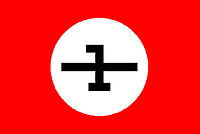Sumka
|
SUMKA
|
|
|---|---|
 |
|
| Leader | Davud Monshizadeh |
| Spokesperson | Shapour Zandnia |
| Founded | December 6, 1941 (unofficially) October 13, 1952 (officially) |
| Headquarters | Chalus (northern Iran), Tehran |
| Ideology |
National Socialism Anti-Arabism Anti-Islam Anti-Semitism Anti-Communism Anti-Capitalism Persian nationalism |
SUMKA was an Iranian neo-Nazi group that is otherwise known as Hezb-e Sosialist-e Melli-ye Kargaran-e Iran or the Iran National-Socialist Workers Party. They are a nationalist group aiming to glorify the Aryan history of Iran.
The group was formed in 1952 by Davud Monshizadeh, a professor at Ludwig Maximilians University of Munich, who served with the SS and had been injured fighting in Berlin. Before this the name had been used informally to refer to those in Iran who supported and helped to fund Adolf Hitler during the Second World War. Monshizadeh would go on to serve as a Professor of Persian Studies at Alexandria University and Uppsala University. Despite building up a minor support base in Iranian universities, the party did not last long. It has been claimed that the party enjoyed funding directly from Reza Pahlavi and some Georgian-Iranians for a time. The official logo is the Simorq flag. The emblem is the Simorq bird which was taken from the Shahnameh (Book of Kings) at the centre.
The group briefly attracted the support of young nationalists in Iran, with Daryoush Homayoun, who would later rise to prominence, an early member. Monshizadeh was known as something of a Hitler worshipper and was fond of many of the ways of the Nazi Party, such as their militarism and salute, as well as attempting to approximate Hitler's physical appearance. On this basis the group adopted the swastika and black shirt as part of their uniforms.
They were firmly opposed to the rule of Mohammed Mossadegh during their brief period of influence and the group worked alongside Fazlollah Zahedi in his opposition to Mossadegh. Indeed, in 1953 they were part of a large crowd of Zahedi supporters who marched to the palace of Mohammad Reza Pahlavi demanding the ousting of Mossadegh. The party would become associated with street violence against the supporters of Mossadegh and the Tudeh Party.
...
Wikipedia
